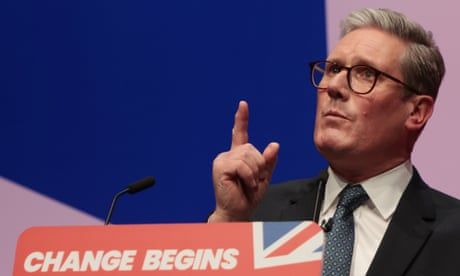
Labour’s leadership should have defended its choice to cut winter fuel payments. Instead, it chose the worst of all options
Sir Keir Starmer talks a lot about how tough he is. The word came up a number of times in his speech to Labour delegates in Liverpool this week. It is undoubtedly true that his own personal resilience through some very choppy moments helped secure an election landslide. He also says he accepts unpopularity as the price of power. So what does the new prime minister with a huge parliamentary majority do when he faces a small challenge over one of his unpopular decisions? His team pushes the argument far away, rather than engage with it.
The argument was over the cut to winter fuel payments, while Sir Keir’s would-be opponent was Sharon Graham, leader of Unite, Britain’s second-biggest trade union. Her motion opposing the cut was scheduled for early Monday afternoon while the entire frontbench was in Liverpool. Then, just a few hours before the scheduled time, Ms Graham was told that the motion would be moved. It would now take place almost at the very end of the conference. By the time the non-binding motion was heard, and passed by a show of hands, Sir Keir was on his way to New York for the UN general assembly.
Political history is full of Labour leaders who find their own party conference to be a source of annoying opposition. Hugh Gaitskell, Harold Wilson, Jeremy Corbyn (over Brexit policy): they all had to face the rough music of Labour members. The constitutional historian Meg Russell relates that “as early as 1907 Keir Hardie … threatened resignation rather than be held to conference policy on female suffrage”. Similarly, no Labour party conference is complete without a few stitch-ups, nobbles and other backroom deals. If Bismarck really did compare laws to sausages (“it is better not to see them being made”), the old Prussian should have tried sitting in the meeting room of a conference centre at some blurry hour after midnight.
But still, there is a reason Clement Attlee called Labour conference “the parliament of the movement” – and parliaments have debating chambers. This Labour government’s first significant budgetary policy was to means-test the winter fuel allowance, and Labour MPs admit to receiving a deluge of mail on the subject. The Unite motion suggests a number of means to avoid cutting money to pensioners, including a 1% tax on the 1% wealthiest – the kind of measure not so long ago supported by Sir Keir and his chancellor, Rachel Reeves. They’ve chosen otherwise; they have their reasons, and they should be willing to state them before Labour’s grassroots.